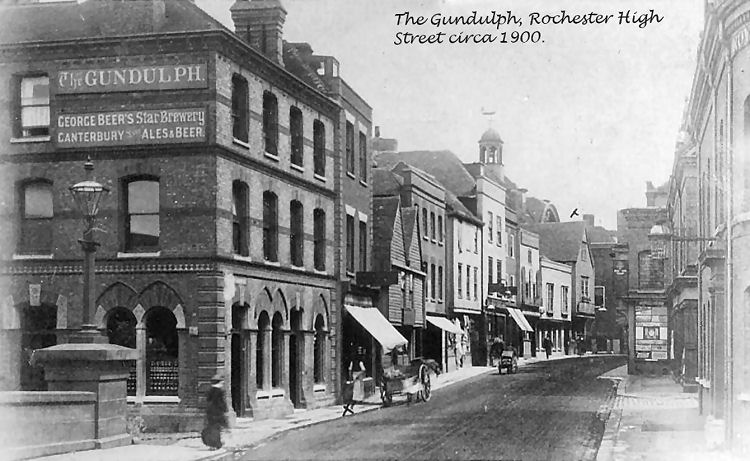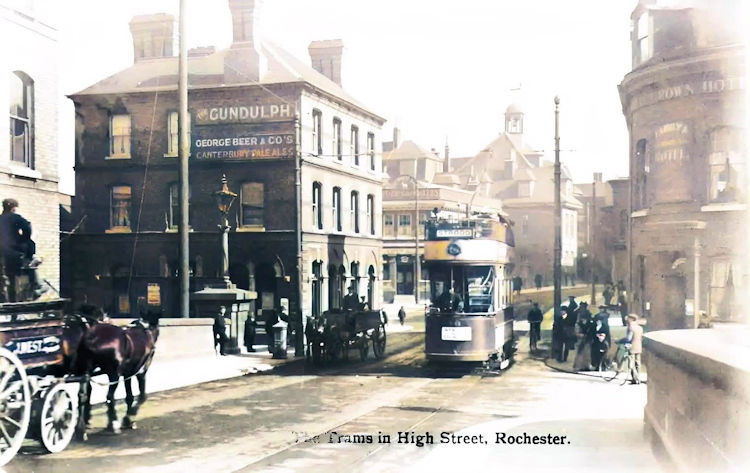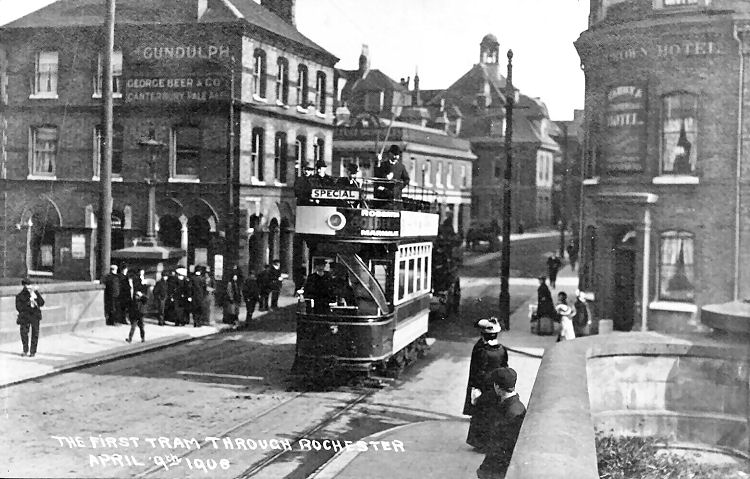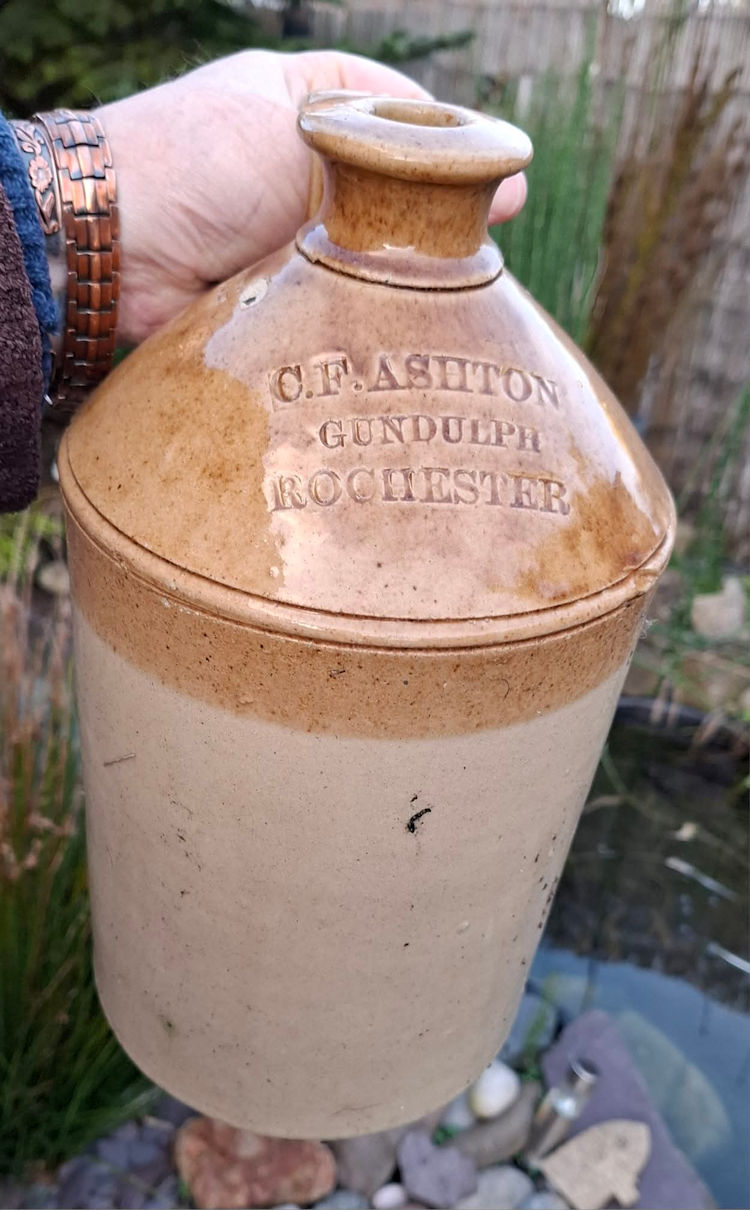|
From the Rochester and Chatham Journal and Mid-Kent Advertiser, Saturday, September 2, 1876.
The "Gundulph Tavern."
Shortly before 1 o'clock the only fresh application of the day was
made before the members of the Licensing Committee those
present, vis., the Mayor, Alderman Cules, Webb, and Naylar; Messrs.
Furrell and Homan. The absent member of the committee was
Mr. Ball.
Mr. Hayward said he appeared, as he dared say their worships might
imagine almost before he opened his mouth, to make an
application for Mr. James Boulden for a spirit licence for the "Gundulph
Tavern." He was almost afraid to say how many times he had
made that application, but every time he did it with renewed hope
because he could not help thinking that with one more years
reflection, the magistrates must feel satisfied it was a licence
which must be granted. He was certain that there worships would all
meet this matter entirely in an unprejudiced way. He did not believe
any gentleman on the bench was a member of a Band of Hope,
or a Permissive man, or a tee-totaler, or anything of that sort, or
he would be inclined to make the objection that was made at
Brighton, that a person holding those peculiar opinions was not
entitled to deal with such an application. He asked them not to
consider who was the licensee or owner, or occupier of any adjoining
house in the "Gundulph," but to look at the merits of the case
and say whether that these had not arrived when it was fit and
proper but that a licence should be granted to this house. Mr.
Boulden's character was known to all the magistrates, and if the
licence was refused he was quite sure it would not be on any point
of character. He was sure Superintendent Radley would say it was
impossible any house could be better conducted than the
"Gundulph," or that any more respectable man could hold it. The next
thing was, was the house of fit and proper one for a licence?
- and there was no doubt it was. It was built expressively for a
licence and was in every degree fitted for use. It was raised at £50
a
year and had ample accommodation of every kind. So that Mr. Boulden
was just the man and his house was just the place for a
licence. The only other question was as to the necessity of another
licence, and he could not conceive how any six gentleman well
acquainted with Rochester, as the gentlemen on the bench were, could
have any doubts from that subject. He supposed his friend
Mr. Prall came there to oppose for the "Crown" or the "Half Crown"
or "Florin," as it was jocularly called by some but that was a
house of a different character entirely to Mr. Boulden's, and he did
not believe that a licence to the "Gundulph" would in any degree
whatever affect the "Crown," the "Bull," or the "Kings Head." One
very important reason why the licence should be granted was that
a Forester Society, numbering some 340 members, was now held in the
house. It was a very hard thing that a Forester must be
confined to beer, which disagreed with many people, while spirits,
whiskey in particular, were a most wholesome thing and very
desirable on certain occasions (laughter). The magistrates might say
"We appreciate everything you have said up to the present
moment, and we think you are right; but here comes the pinch: Look
at the number of houses there are in the parish and how you
say they fresh licence is wanted?" But let him call their attention
not to the number there were, but to the number they were not;
the number taken away since a new licence was granted in the parish.
Mr. Hayward numerated the "Flushing," the "Golden Cross,"
the "Crown tap," the "Bull tap," the "City Arms," the "City Coffee
House," and the "Cock." Considering that all these licences had
been removed from the parish was it not the duty of the magistrates
to grant one in their place? How many licences were there to
go before their worships would grant a new one? On the Strood side
of the bridge the "Duke of Gloucestershire" and the "Lobster"
had gone, and their worships had granted six new licences, thus
increasing the number by four. They would be told - look how the
population has increased in Strood! He asked what made the
magistrates grant a licence to the "Prince of Wales" when the
"Watermill Tavern" was within the length of the hall from it? What
made them grant another licence near houses already licensed?
He was not saying their worship were wrong in this; he was a
free-trader (laughter). If they gave a licence to every respectable
man
who applied for it then Mr. Boulden would be flourishing, because
his articles were good, his attention to the guests were great.
Why was not a publican to be dealt with in the same way as a
butcher, or a grocer, or a baker, subject of course to care being
taken
that a proper man was put in, and that he was put out again if he
did not properly conduct his house? If there worships looked at it
in that light, let them grant the licence in every case. He was not
there to oppose anything that day (laughter). He would say
something different next Tuesday, but he would not be be
inconsistent
then, because it would be in a different case (renewed
laughter).
Mr. Farrell here remarked that the "Queens Arms" had been pulled
down, and Mr. Hayward said that was another house he ought
to have mentioned. Mr. Boulden was at the present time actually the
builder of the licence of the "Flushing," but owing to some
technicality he was not able to have it transferred to the "Gundulph."
The Clerk (Mr. J. T. Prall) remarked that the licence was not
transferred because the "Flushing" was not pulled down for a public
purpose.
Mr. Hayward said it was some such thing as that, but why not do
justice to him now, and let him have the licence?
Mr. R. Prall said he appeared, he believed for the seventh time, in
opposition to this application. He had listens for anything new,
but, as Mr. Hayward had said, it was very difficult to produce
anything new when one appeared so many times. All they had heard
this time they had heard before, with the exception of the
additional house mentioned by Mr. Furrell as being pulled down. Mr.
Hayward had introduced a lot of extraneous matter about Free Trade,
but it was not a matter as to his opinion, but simply as to
whether an additional licence was required. The circumstances of so
many licences ceasing to exist was a dangerous weapon for his
friend to play with, because it cuts both ways, and it cut in his
way to show that there was no necessity for these licences. It would
occur to the magistrates, as businessman, that if there were any
value in a thing it was not allowed to go away, and one could really
only come to the conclusion that these licences had ceased because
there was no want for them; it showed that in past times too
many of these licences had been granted; they did not want to go
back; they did not want to retrograde at all. Where it has been
tried, in Liverpool, to grant all licences, he believed it had
signally failed. Was it really necessary that there should be
another
licensed house in this locality? He was not going to follow Mr.
Hayward into what he had said respecting certain licences being
granted on the other side of the water; there were, no doubt,
certain reasons urged which were satisfactory to the bench at the
time they were granted. Granting that Mr. Boulden and his house were
qualified to have a licence, there was this material fact that
the "Gundulph" was surrounded by public houses. The application had
been argued before the bench ever since 1869 and what
new facts were now put forward? The only reason that could be heard
was that the house was a very good one, that and that it was
exceedingly hard to refuse it a licence, but he submitted with the
strongest confidence that the magistrates could not come to the
conclusion that it would be a proper act to increase the number of
licensed houses in the locality, and that a person could not,
because he had made a speculation, claim a licence of the bench.
What could be strong evidence that in his eyes of the public there
was no necessity for another license, than the facts that were so
many licences had gone away that there had been no application to
retain them? It was simply that the owners had put up this house and
thought the bench ought to give them a licence.
The Bench and the Clerk retired into the Council Chamber to consider
the application and were absent 20-minutes. On their return
the Mayor announced that the application was refused.
The Court and the solicitors present then again adjourned for half
an hour to discuss a pretty little luncheon provided in the Council
chamber. Mr. A Lemon, of the "Crown Hotel," being the efficient
caterer.
On returning into the Guildhall the magistrates who remained
proceeded with a police business and it was 3:30 before the Court
finally rose.
The adjourned licensing sessions was fixed for Saturday 30th
September. |



